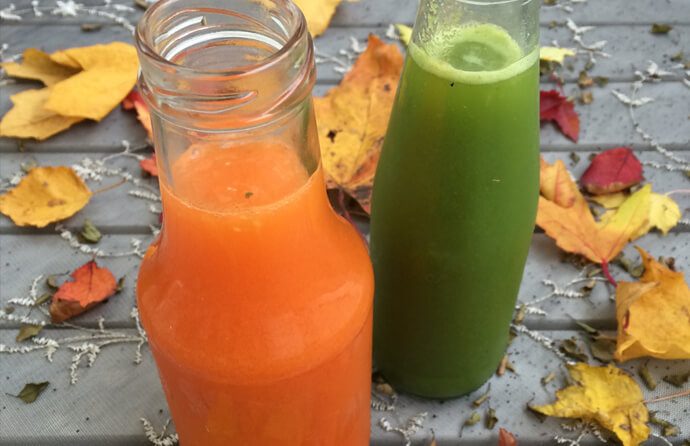Many media articles on juicing focus on ‘cleansing’, sometimes called a ‘juice fast’ or ‘juice reboot’. However, you do not have to cleanse to experience the benefits of juicing. Supplementing your existing diet with fresh, extracted vegetable juice is a great way to boost your vitamins and nutrients intake.
Consume more veggies!
Consuming more vegetables and fruit can prolong life. According to researchers at University College London, fresh vegetables have the strongest protective effect, followed by salad and then fruit, yet most people fail to consume the recommended 5 portions per day.
Despite the evidence that people who eat at least five portions a day have a lower risk of heart disease, stroke and some cancers, the National Diet and Nutrition Survey shows that just 30% of adults and 41% of older adults meet the “5-a-day” recommendation. The situation for children is even worse. Just 10%, of boys and 7% of girls meet the “5-a-day”recommendation.
Juicing is a great way to close that gap and pack more nutrients into your day, flooding your body with a high dose of vitamins, minerals and antioxidants to give you an amazing boost.
Juicing is not a silver bullet though and when drinking your veggies, it is important to use a broad range of ingredients.
Toxicity is one of the underlying causes of lifestyle disease. Just as being intoxicated by alcohol or drugs can effect you physically and mentally, an excess of any toxin in the body can develop into dis-ease.
Toxicity is not the only risk of consuming a limited range of nutrients. Having too much of something can be problematic and so can not having enough.
Overfed and undernourished
Strange as it may sound, research has shown a correlation between obesity and malnutrition. In other words even when people overeat they can still be deficient of the nutrients their body needs.
In order to be maintain optimum health you need to supply your body with a wide variety of different foods to ensure it can extract the nutrients it needs.
Marketing from the food and fitness industries typically focuses on calories and macro nutrients: carbohydrates, proteins and fats, but the reality is that our bodies also need a broad range of phytonutrients.
When juicing it is important to know that some vitamins, such as vitamin C and B vitamins are water soluble making them easier to absorb in juice, where as vitamins A, E, K are fat soluble and hence require the addition of a health fat source such as avocado or cold pressed oils.
Choose a wide variety of fruits and vegetables as they all have different proportions of vitamins and minerals that will help to keep you healthy.
“You don’t have to ‘cleanse’ to benefit, from juicing”
A variety of greens is important
Almost all leafy greens contain alkaloids such as oxalic acid. Moderate amounts of these alkaloids included in green juices can help to strengthen the immune system. However, if you keep using the same leafy green for many weeks eventually the same type of alkaloids may accumulate in your body and in some cases cause unwanted symptoms of poisoning. The key is to use a good variety of ingredients in your juices. Focusing on local seasonal produce will help to achieve this.
Article written and supplied by Neil Martin, Natural Juice Junkie.










